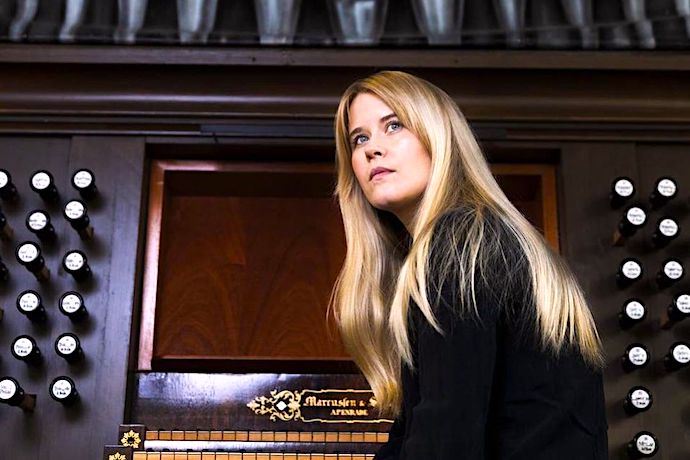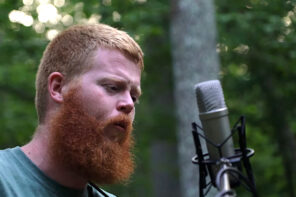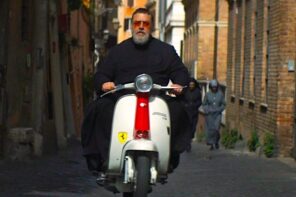Allow me to play devil’s advocate for a moment, so to speak. Have you ever considered the idea that Swedish musician and composer Anna von Hausswolff might actually be, as you say, “a high priestess of satanic harmonies?”
I mean not you per se, or even at all, but the New York Times, which recently ran an article based on an interview with Ms. von Hausswolff, who had a December concert in a French church abruptly canceled by right-wing Catholic protestors who had decided on the basis of extremely thin evidence that she was in fact consorting with Old Scratch. It’s definitely worth a read, for the story itself, but more importantly, for the ways it reveals a double standard on press coverage of the US Christian right.
It’s one of those pieces that seems more perplexing the longer you look at it. There isn’t really enough about von Hausswolf herself to be a personal profile. Even though the piece ran in the Times’ music section, there isn’t enough about her art for it to be a proper musical profile.
And though there’s some context given to the protestors, the larger story about reactionary Catholic protest at music venues around Europe remains what GetReligion’s Terry Mattingly calls a “ghost”—a religion angle to a story that sits there in plain sight without ever being properly explored. I came away from this piece very confused about its purpose, and with the feeling that something was missing. My guess? About 1000 words, excised in an editing process run amok.
One candidate for the stuff that wound up on the cutting room floor is any direct expression of the protestors’ perspective. Going back to playing devil’s advocate: What if they’re right? What if von Hausswolff’s music really is more appropriate for a “black mass” and has no business being played in a Catholic church? What if von Hausswolff really did sleep with the devil, as the lyrics to one of her songs indicate?
The piece never stops to consider such questions, much less gather some quotes from the people who ask them, instead treating them as facially ridiculous. And so they are. But even ridiculous ideas are worth considering, as anyone who’s ever heard about the QAnon cult and its effect on American politics can attest. At first they laugh at you, then they dismiss you, then all of a sudden, they find out you’re taking over the Capitol.
Likewise, the lone academic voice mustered to explain the protestors calls them “a well organized minority who’re very good at getting attention in the media”—as though they were mostly a nuisance. The author nods in the direction of the conflict with a brief mention of how “disagreements between conservatives and liberals over issues like gay marriage and abortion have become increasingly heated in parts of Europe,” and how some Catholic conservatives like to protest art they “consider blasphemous,” but that’s all the more detail he goes into.
Given the hard turns to the right seen in many European nations these days, often fueled by goons seeking to enforce social mores, all of this seems lacking. It’s entirely possible that these protests aren’t spontaneous flukes whipped up by hysteria, but rather calculated efforts to assert political muscle in a particular form.
And, in fact, von Hausswolff names the issue herself. In an Instagram post the day after her canceled concert, she speaks of Catholic integralism, which scholars define as the idea that “rendering God true worship is essential to that common good, and that political authority therefore has the duty of recognizing and promoting the true religion.” In plain English: the government is responsible for enforcing social norms based in religious faith.
Given the hard-line separation of church and state in France, this isn’t a perfect fit; the protests were directed at the church, rather than any political authority, after all. But it’s a tantalizing angle worth drawing out for further exploration. More to the point of media criticism, it’s a big fat old ghost that the main character of the story is pointing directly at. Why on earth would you not want to pursue it in some depth?
It’s also worth noting a curious intellectual inconsistency in a story like this. As with Kathryn Post’s recent RNS piece on disaffected conservatives leaving the Reformed Church in America, there’s a distinct lack of interest in allowing—or forcing—conservative Christians to explain their perspectives.
That leads to a significant imbalance in how faith and social values are discussed. Anyone who’s read mainstream religion coverage in the New York Times or other outlets knows that there are conventions that apparently must be obeyed: any mention of a liberal perspective must be followed by a lengthy discussion of declining religious adherence, usually among mainline Protestants, and a countering quote from religious conservatives who are taken with absolute sincerity, no matter how thin the pretext of their nonpartisanship.
Perhaps it’s asking a lot of a European culture piece to cover this territory. But I can’t help thinking that had this whole controversy taken place in the US context, its shape and content would have been much different.
You can bet, for example, that von Hauswolff’s claim that “Catholic integralism won over art, but not over love” would have been “balanced” with a proponent of integralism explaining why Catholicism is a more authentic expression of the French identity than the music of an agnostic Swede. But more importantly, omissions like this demonstrate just how flawed the Times’ typical coverage, and the coverage of culture war conflict in most American media, is. Outlets like the Times are entirely too credible in their failure to call out coercive, authoritarian theologies and the politics they sponsor when the story takes place in a context closer to home.
Putting that failure in a funhouse mirror simply allows us to clearly see inconsistencies that otherwise seem normal. If a European arts and culture story can treat conservative opposition to an artist as transparent and unpopular nonsense, why shouldn’t an American-focused piece do likewise? Instead, we’re forced to listen to supposed Christian mouthpieces, who represent not much more than their fax machines and the reactionary donors who pay them.
So one way or the other, please. Either give Anna von Hausswolff’s integralist detractors the opportunity to plead their case that she is in fact the high priestess of satanic harmonies, or else admit that a “well organized minority who’re very good at getting attention in the media” in the US (i.e. the Christian Right) aren’t worth listening to. You might get a pretty good interview out of the first option, but overall, the second is sounder journalism. It’s also better for readers and, perhaps more importantly, democracy itself.
###
The author encourages reader feedback and tips: dan@religiondispatches.org





